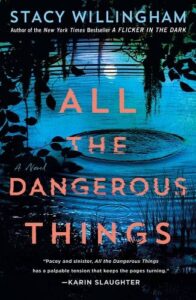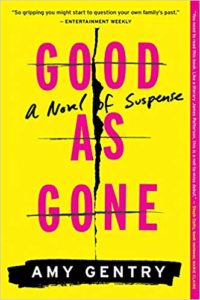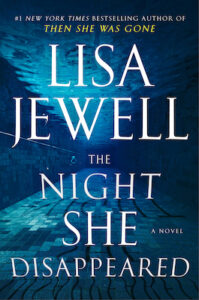Mothers, it’s all your fault. But you knew that, right?
Whether you:
–Let your little boy wander away in a crowded shopping area, never to be seen again
–Let your toddler or tween daughter get taken from your own house
–Encouraged your adult daughter to travel abroad and into the arms of dangerous strangers. What were you thinking?
Welcome to a specific subgenre of psychological suspense novel, the one that explores parents’ fears—let’s be honest, mothers’ fears—about what might happen to our children. Whether they are stolen from us or go missing in other ways, including metaphorical ones, these novels are about more than just mothers’ inclinations to blame ourselves. They are also about control and losing control, grief, the challenge of accepting unavoidable change, motherly intuition, and whether we can ever truly know anyone—even that beautiful person who was, for a time, the center of our universe.
I wasn’t thinking about any of that five years ago, when I read my first Lisa Jewell novel, Then She Was Gone, about a mother grappling with all she’d never know about the presumed death of her missing 15-year-old daughter, Ellie Mack.
I was sitting on a rocky island beach at the time, alone with a paperback that was both poignant and disturbing. My daughter was in college, several thousand miles away. I missed her dearly, and that yearning must have allowed Jewell’s quiet, character-rich novel to speak to me in a particular way. That summer day was when I decided in earnest to jump genres, from leisurely paced historical fiction to a more urgent kind of psychological suspense.
When I first started drafting The Deepest Lake, set in Guatemala, about a mother named Rose who travels to Lake Atitlan to seek answers in the wake of her daughter’s death, I depicted the mother-daughter relationship as close and conflict-free. In that draft, Rose had trouble piecing together the details of 23-year-old Jules’s final hours. The lake’s depth made it impossible to find and retrieve a body for examination, and people who’d spent time with Jules weren’t talking. But Rose didn’t question her fundamental understanding of her daughter.
Revisions brought me to a new and less comfortable place, informed by personal experience. Certainly, I feel close to my own daughter, an energetic world-traveler like Jules. But did I know every cliff she scaled, every person she kissed, every rule she broke? Of course not. Like Rose, I had to admit the difficulty of decoding texts and the impossibility of knowing how to read a young adult’s moods and motivations—especially when that child has been out of sight for many months.
As a writer, and as a mother, I had to dig deeper to bring my murkiest anxieties into the novel. It isn’t pleasant to picture one’s child suffering from depression, engaging in risky behaviors, falling under the sway of a despicable person, or simply becoming an independent and less knowable adult. But becoming a suspense writer requires imagining those kinds of possibilities, from real dangers to more common forms of emotional loss.
At the same time, I still come back to the idea that a mother’s love is powerful, as is a mother’s intuition. We may not know our children perfectly, but we know when something isn’t right. That knowing impels us—and characters like us—to act. Only a thriller’s final pages will tell us whether that love-fueled action has come too late.
But first, I read more books. Here are a handful of emotional page-turners that convinced me the missing-child trope is both powerful and capacious, with room for further writerly exploration and interpretation.

All the Dangerous Things, by Stacey Willingham
In Stacey Willingham’s All the Dangerous Things, life comes to a halt when Isabelle Drake’s toddler-aged son Mason is taken from his crib in the middle of the night. In the year that follows, our narrator’s marriage implodes and Isabelle becomes an obsessive amateur sleuth, devoting herself to understanding what happened to her baby. Lecturing on the true crime circuit and submitting to interviews by a podcaster—anything to find the truth—only worsen Isabelle’s anxiety and exhaustion. You know how readers often say that a well-described place becomes “a character” in a novel? Here, insomnia itself is a character—a tricky foe familiar to any person who has suffered extreme sleep deprivation.

Little Secrets, by Jennifer Hillier
The trail has gone even colder in another young-missing-child quest, Little Secrets by Jennifer Hillier. A year and a half after her five-year-old son is grabbed from Pike’s Place Market by a man in a Santa suit, successful salon owner Marin hires a private investigator, whose digging leads not to the child but to other unsavory revelations, starting with the fact that Marin’s husband is having an affair with an art student named Kenzie. Numerous other secrets and twists follow. Unlike many novels of this kind, Hillier packs in surprises without depending on unreliable narration. The storyline jets beyond doubtful grief into red-hot anger, as Hillier’s Marin uses her rage to get to the bottom of things. If you enjoy flawed characters and a dual POV structure that complicates readers’ sympathies, this one’s for you.

Good as Gone, by Amy Gentry
What’s more disturbing than a missing child? The idea that you might not recognize your own missing child years later, when she returns to you. That’s the high-wire premise behind Amy Gentry’s Good as Gone, in which returned teenager Julie seems curiously unfamiliar to her mother Anna. Structurally, this thriller is complex, with alternating chapters that tell us the mom story alongside the slowly unspooled backstory of a teen on the run, struggling to survive. Far more than just a novel about abduction, Good as Gone considers topics from sexual violence to identity and how we are shaped by experience.

Lisa Jewell, The Night She Disappeared
In Lisa Jewell’s The Night She Disappeared, we arrive at the story of a teen old enough to be a mother herself. Tallulah, 19, has gone on a date, leaving her baby in the care of her mother, Kim. Then Tallulah disappears. Kim has a hard time believing Tallulah would take off without her child, but then again, young adults are unpredictable.
Having thoroughly enjoyed my fill of mother-and-child stories in which the very young victim is unquestionably innocent, I’ve found myself increasingly drawn to novels like these precisely because the missing teen or young adult plays a more active and ambiguous role. Our grown or nearly-grown children sneak out, take risks, befriend the wrong people. They fail to answer emails and texts. They try on new identities. They make dangerous mistakes.
On top of that, everything we think we know about our older children relies on the interpretation of spotty memories. How serious was that crisis she had as a freshman in college? What was that argument we had last summer? A certain tone, a look, a silence—these are the clues which only a parent, not a P.I., can decipher.

















